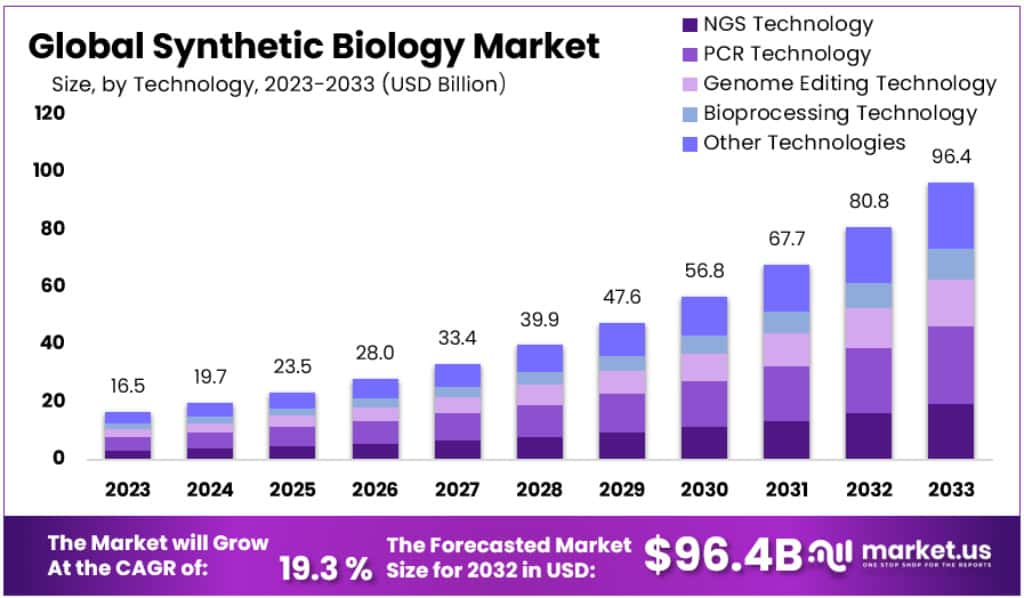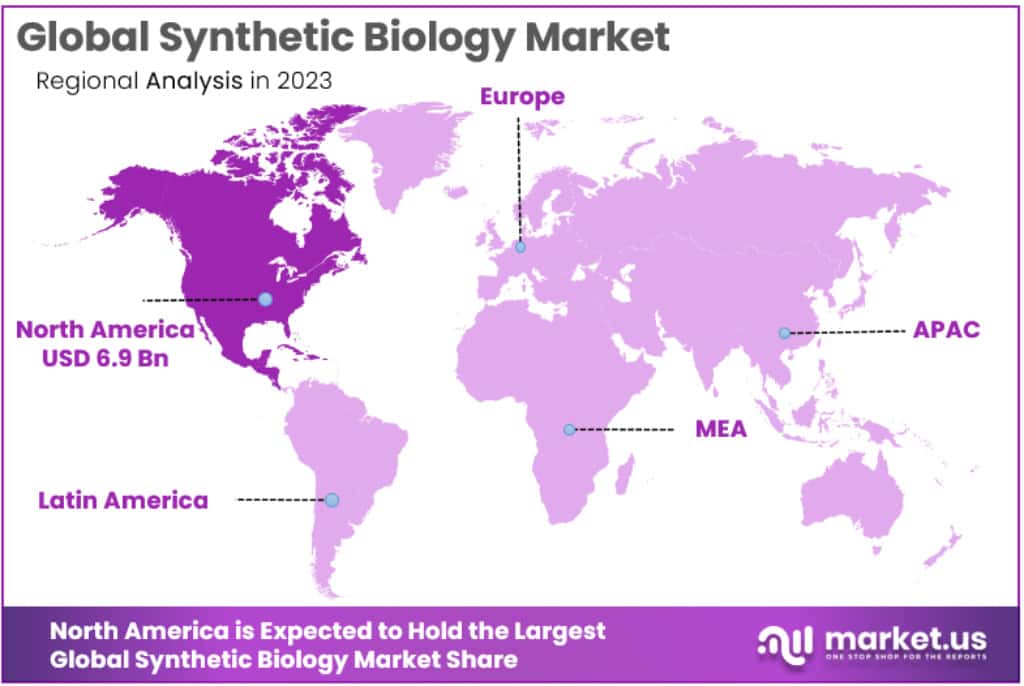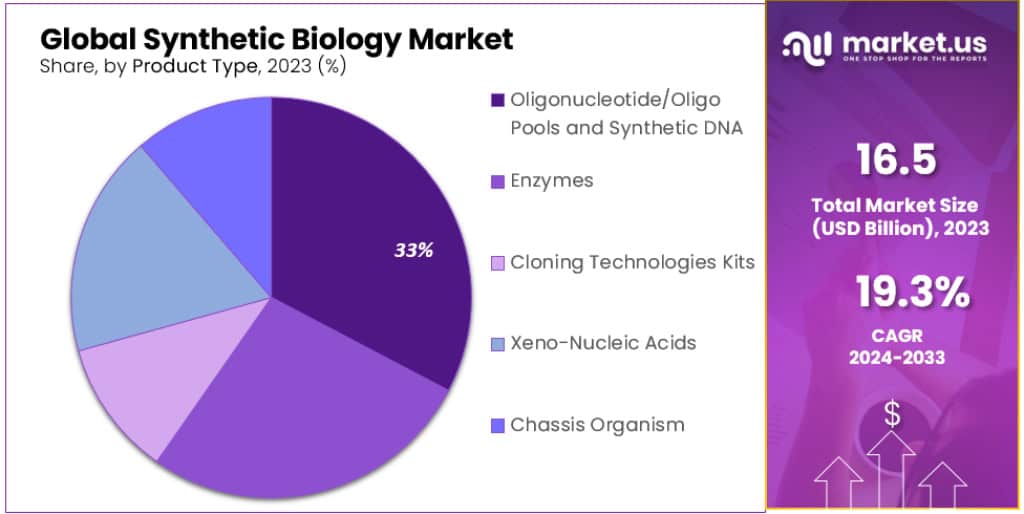New York, Jan. 29, 2024 (GLOBE NEWSWIRE) -- According to Market.us, the Synthetic Biology Market size is projected to exceed USD 96.4 Billion by 2033, with a promising CAGR of 19.3% from 2024 to 2033.
Synthetic biology has gained better achievement leading to a change in technology in various fields such as living beings, Biocomputing and therapeutic genome editing. The development of synthetic biology product is only possible because of the areas of gene editing, gene circuit design, metagenomics discoveries and directed evolution. Hence, synthetic biology provides a helping hand for upgradation of nature, impacting the areas of medicine, product creation and agriculture.
To Gain greater insights, Request a sample report @ https://market.us/report/synthetic-biology-market/request-sample/

Key Takeaway
- A scientific field where researchers are involved in modification or creation of living things to have new features is known as Synthetic Biology.
- Based on technology, PCR accounted for more than 28.1% of the global revenue share.
- Target introduction of DNA sequences in living things is only possible because of Next Generation Sequencing(NGS).
- Synthetic biology played a significant role in upgrading the biopharmaceutical drug discovery.
- Based on end user analysis, the biotechnology and pharmaceuticals segment dominated the synthetic biology market in 2023.
- The market is majorly driven by the everlasting need for synthetic RNA, DNA and genes used in a variety of ways.
Factors affecting the growth of the Synthetic Biology industry
Several factors are affecting the growth of the Synthetic Biology industry. These include:
- Increased demand for drug delivery: Synthetic biology can be employed for the creation of Nano particles, which helps in drug delivery process. For example, designer nanoparticles that make blood cells eat away from the inside out portions of the atherosclerotic plaque that cause heart attack.
- Technological advancements: Sophisticated technologies have empowered synthetic biology companies to develop exceptionally potent devices, leading to the expansion of the synthetic biology market.
- Treatment of malaria: the use of synthetic biology can be done for engineering yeast which in turn can be used for the production of medicines. For example, the first drug(Artemisinin) produced in this way was for the treatment of malaria.
Top trends in the Synthetic Biology Market
There have been numerous innovations in synthetic biology in recent years, and the field is rapidly evolving. The introduction of CRISPR-CAS9, a powerful genome editing tool allows scientists to make precise changes in DNA sequences in living organisms. This can potentially make a way for treating genetic diseases by the development of new treatments. Furthermore, scientists came up with production of synthetic cells with the aid of synthetic biology, that are able to perform basic functions such as reproduction and response to stimuli. These cells prove to have potential applications in biotechnology, medicine and environmental remediation.
Regional Analysis
Owing to the better laws, improved financing for the synthetic biology products development and government support, United States held a strong market place grabbing a global revenue share of 42.1%. A few startups in the regions such as Poseida Therapeutics, and Greenlight Biosciences raised more than US$ 3000 million in 2020’s first half. The synthetic biology industry propelled in the region, as the primary focus is on research in drug discovery and genomic structure prediction. Due to the presence of many synthetic biology hubs, Germany is expected to show a fast growth in the synthetic biology market during the foreseen period.

Explore the strategic advantages our report holds for your business. Request a brochure to find out more https://market.us/report/synthetic-biology-market/#inquiry
Scope of the Report
| Report Attributes | Details |
| Market Value (2023) | USD 16.5 Billion |
| Forecast Revenue 2033 | USD 96.4 Billion |
| CAGR (2024 to 2033) | 19.3% |
| North America Revenue Share | 42.1% |
| Base Year | 2023 |
| Historic Period | 2018 to 2022 |
| Forecast Year | 2024 to 2033 |
Market Drivers
The provision of substantial funding by government agencies and private investors enables the advancement of innovative projects related to synthetic biology. For instance, in UK, a $5.7 million funding was provided to SynbiCyte, to support synthetic biology startup, promoting bio economic growth. These growing investments in synthetic biology research and development are driving the market significantly.
Market Restraints
Synthetic biology on the flip side has a greater concern regarding biosafety and ethical issues. The potential risk with the release synthetic organisms into the environment can cause unintended interactions, mutations and formation of antibiotic resistant superbugs. In addition to this, the regulatory actions can also restrict the market expansion.
Opportunities
Research and development being a vast area, requires new technologies to enhance the analysis and decision making. Here, the incorporation of artificial intelligence and machine learning played a significant role in synthetic biology. The focus on leveraging AI/ML, by government support, is the main focus of industry players in recent times. For example, an alliance between BigHat biosciences and Merck’s AI enables platform for protein engineering are expected to foster the market. Hence, these factors provide abundant opportunities for the market growth during the forecast period.
Instant Access Upon Purchase | Get This Premium Research Report Now https://market.us/purchase-report/?report_id=31004
Report Segmentation of the Synthetic Biology Market
Product Type analysis
Based on product type, the synthetic biology market holds a division of oligonucleotide and synthetic DNA, cloning technology kits, Xeno-nucleic acids and chassis organism. Amongst this, oligonucleotide and synthetic DNA dominates the market and is accounted to hold large market share of 37.2%. Molecular and synthetic biology has the capacity to design unique DNA oligos. The organizations like Integrated DNA technologies and Life Technologies, provides custom primer services. In addition to this, the decline of synthesis cost and high need for synthetic RNA, DNA and genes are adding a significant advantage for the segment growth.
Technology analysis
With respect to technology, the market is classified into NGS, PCR, genome editing and bioprocessing technologies. PCR technology held a large market revenue share of 28.1%, dominating the other segments in 2023. Owing to the quick, simple and highly reproducible process, PCR is employed for various gene cloning and DNA recombination processes. In addition to this, gene quantification also plays an important role in synthetic biology operations. For example, the Synbio Technologies launched Sony 2.0 technology, that can successfully clone gene targets without the use of restriction enzyme sites.
Application Analysis
As far as applications are considered, healthcare, clinical, non-clinical, non-healthcare, biotech crops, specialty chemicals and biofuels are the various segments of the market. The significant role of healthcare segment made it to grab a large market share of 18.7% in 2023. Synthetic biology has greatly improved the scope and scale of biopharmaceutical drug discovery, providing practical solutions to the problems linked with biopharmaceutical production.
End User Analysis
Based on end use, the synthetic biology market is disjointed into biotechnology and biopharmaceutical companies, academic and government research institutes. The biotechnology and biopharmaceutical companies is accounted to hold a large market share of 52.3%, dominating the market in 2023. The production of new drugs aided by synthetic biology is carried out by biotechnology and biopharmaceutical companies. For example, Januvia, a treatment for diabetics, was launched by Merck, with the aid of synthetic biology process.
Impact of Macroeconomic Factors
The arrival to two significant global changes, COVID 19 and Russia-Ukraine war had a profound impact on Synthetic biology market, leading to the complex set of factors reshaping the market trajectory in unforeseen ways. The onset of the COVID-19 pandemic brought about substantial changes in consumer behavior and business operations. Simultaneously, the Russia-Ukraine conflict introduced an additional layer of uncertainty and volatility into the global economic landscape. As businesses navigated these geopolitical challenges, the Synthetic biology market adapted to the evolving environment, with brands reevaluating their marketing strategies to align with shifting consumer sentiments.
Recent Development of the Synthetic Biology Market
- In April 2021: Spiber, a Japanese firm employed precision engineered microbes for the production of spider silk, raising the company’s revenue to $240 million.
- In November 2021: Modern meadows and Vitrolabs, by the process of DNA editing added two enzymes to the yeast culture, enabling it to produce collagen that effectively replicate skin protein, and hence a malleable network of fibres was formed, leading to the production of genuine leather.

Download Latest Analysis Sample PDF (Including Full Table of contents, List of Tables & Figures, Chart): https://market.us/report/synthetic-biology-market/request-sample/
Market Segmentation
By Product type
- Oligonucleotide and synthetic DNA
- Cloning technology kits
- Xeno-nucleic acids
- Chassis organism
By technology
- NGS technology
- PCR technology
- Genome editing technology
- Bioprocessing technology
By Application
- Healthcare
- Clinical
- Non-clinical
- Non-healthcare
- Biotech crops
- Specialty chemicals
- Biofuels
By End User
- Biotechnology and biopharmaceutical companies
- Academic and government research institutes.
By Geography
North America
- The US
- Canada
Europe
- Germany
- France
- The UK
- Spain
- Italy
- Russia
- Netherland
- Rest of Europe
APAC
- China
- Japan
- South Korea
- India
- Australia
- New Zealand
- Singapore
- Thailand
- Vietnam
- Rest of APAC
Latin America
- Brazil
- Mexico
- Rest of Latin America
Middle East & Africa
- South Africa
- Saudi Arabia
- UAE
- Rest of MEA
Competitive Landscape
The market leaders are working on a variety of approaches, including partnerships, product investments, mergers and acquisitions, etc. Strong investments from both public and private partners are received to the synthetic biology industry.
Some of the major players include:
- Bota Biosciences Inc.
- Codexis, Inc.
- Creative Biogene.
- Creative Enzymes.
- Enbiotix, Inc.
- Illumina, Inc.
- Merck Kgaa (Sigma-Aldrich Co. Llc)
- New England Biolabs
- Euro fins Scientific
- Novozymes
- Pareto Bio, Inc.
- Scarab Genomics, Llc
- Synthego
- Synthetic Genomics Inc.
- Thermo Fisher Scientific, Inc.
Browse More Related Reports
- Molecular Diagnostic Market size is expected to be worth around USD 19.1 Billion by 2032 from USD 51 Billion in 2022
- Genetic Testing Market was valued at USD 15.9 Billion. This market is estimated to reach USD 39.2 Billion in 2032
- Protein Engineering Market size is expected to be worth around USD 9,329 Million by 2032 from USD 2,691 Million in 2022
- Biohacking Market Size was valued at USD 16.0 Billion And is Projected To Reach USD 83.0 Billion By 2032
- Gene Synthesis Market accounted for USD 1.7 billion and is expected to reach USD 8.3 Billion in 2032
- Artificial Insemination Market size is expected to be worth around USD 4,784 Million by 2032
- Corporate Wellness Market size is expected to be worth around USD 100.8 Billion by 2032 from USD 56.63 Billion in 2022
- Veterinary Electrosurgery Market was worth USD 517.5 Million and is projected to reach USD 1,001 Million by 2032
- Sports Nutrition Market size is expected to be worth around USD 86.0 Billion by 2032
- Disposable Gloves Market Size is anticipated to reach approximately USD 19.5 billion by the year 2033, compared to USD 12.9 billion in 2023
About Us:
Market.US (Powered by Prudour Pvt Ltd) specializes in in-depth market research and analysis and has been proving its mettle as a consulting and customized market research company, apart from being a much sought-after syndicated market research report-providing firm. Market.US provides customization to suit any specific or unique requirement and tailor-makes reports as per request. We go beyond boundaries to take analytics, analysis, study, and outlook to newer heights and broader horizons.
Follow Us on LinkedIn
Our Blog:
